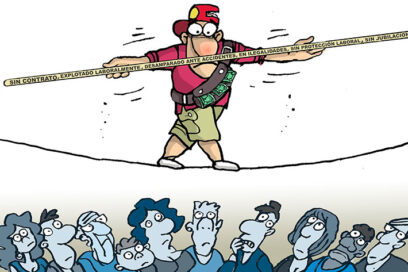Riding a bicycle, from time to time, through the streets of Havana, you hear the cry of a young man: Buy your flowers, buy your flowers! He has to ride for miles to sell all the beautiful merchandise, and it’s not that people don’t like flowers, it’s just that they have become very expensive and most people prefer to take the money to eat. We tried to interview him, but he says no, his name cannot appear because he is an undeclared worker.
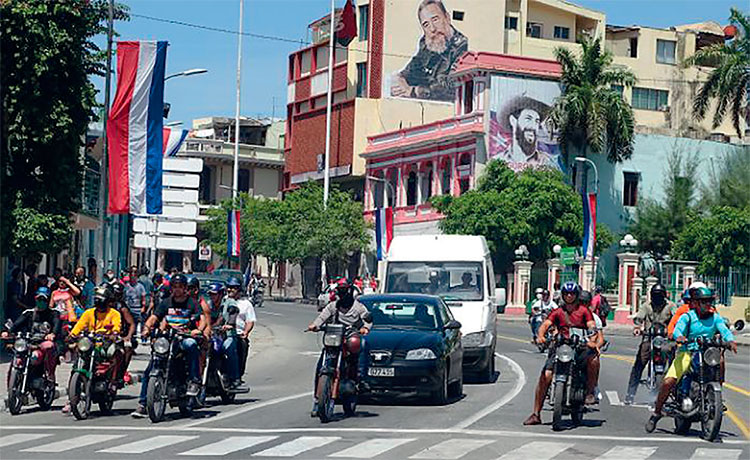
As some say, working off the books is an alternative that pays very well these days. Pedro Quesada, a skilled mason, says he does one job or another whenever he can. My job allows me to do it, there are always people who need their houses repaired,» he said, adding that he does it outside his working hours. Although it gives me a higher income than the state, it does not guarantee my retirement.
In the Cuban work environment, informal employment is now an obvious reality. Many are young, others not so young. Far away, in Matanzas, something similar is happening. For Karla, it is difficult to stay in a single location. Looking for a good salary, she manages to do her shifts as a waitress in the cafeteria of an MSME, as a make-up artist in a beauty salon, and as an online sales manager for the 89 Millas agency, an activity that is a little more flexible.
She does not have a formal employment relationship with any of them. «I am 19 years old and I have been working since I finished studying a the Vocational school. I had to help my mother and a little brother.
In an interview with Ariel Fonseca Quesada, Director General of Employment of the Ministry of Labor and Social Security (MTSS), he said that two years ago, a task force was formed in the Ministry, based on the implementation of the project «Promotion and Access to Quality Employment», in which researchers and decision makers participated. The diagnosis carried out has made it possible to define the main problems that have recently affected the dynamics of work in the country.
He said that although for decades in Cuba most of the economically active population was linked to the state, after the so-called special period, informal employment began to appear, which has become more visible in recent years due to the flexibilization and expansion of the non-state sector of the economy.
Addressing the concept of informal employment, he explained that it includes «all work for remuneration or profit, without any link to social security, whether as an owner or an employee, both inside and outside the informal sector».
He added that it is considered as a defining characteristic «the non-guarantee of a pension due to retirement or age associated with work in the occupation».
The Executive pointed out that with the results of the National Occupation Survey (ENO in Spanish) for the year 2023, for the first time Cuba has official information on informal employment, a figure that stands at 20% of the total number of employed people. The agricultural sector accounts for 23 percent, while Havana, Camaguey and Santiago de Cuba account for 40 percent.
Formally Informal
Although he is not on the payroll, Pedro, 34, has been working in a bakery in the city of Matanzas for almost 24 months. «He earns 1,500 pesos a day and sometimes gets some cooking oil. The bad thing about it is the schedule, always at night, to avoid inspections, and without the right to take a vacation. These are the rules. I’m not complaining, I need money and this is how I get it».
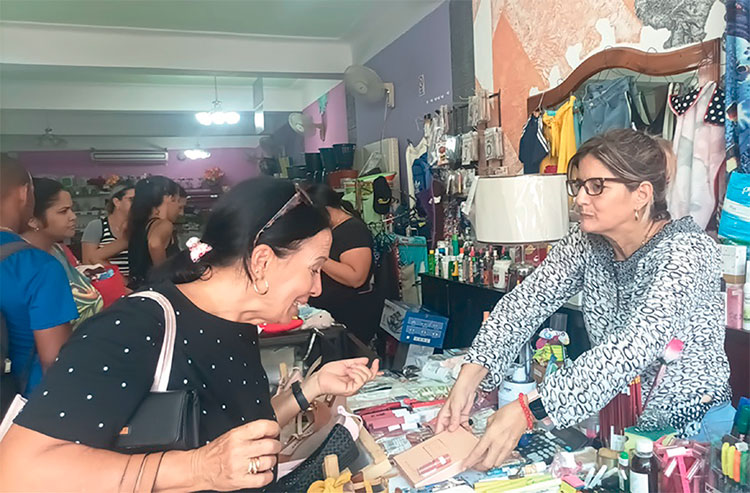
Rogelio Leyva Castellanos, director of the economic department of the Matanzas provincial secretariat of the Central de Trabajadores de Cuba (CTC), points out that inspections have revealed that people from outside certain workplaces are providing services, whether in bakeries, butcher shops or even hotels.
He stresses that this employer-employee relationship, without the mediation of written or verbal contracts, is common in agriculture, with the so-called casual workers who are linked to the usufructuaries, and also with the self-employed (TCP in Spanish) who do not fully declare their workforce.
«Wherever this phenomenon occurs, in addition to the damage and the state of defenselessness that people fall into, there is one aspect that should not be ignored, and that is the fact that it has a direct impact on the country’s employment rate, which distorts the statistics.
This is where the crossroads lies, observes Carlos Ripoll, president of the Association of Economists and Accountants (Anec in Spanish) in the municipality of Matanzas. «The unregistered person affects unemployment and has an influence on an increase in inflation, in addition to threatening the gross domestic product, because the money that was received does not support any income, as a result of the creation of wealth.»
The informal sector is also a burden on the state, Ripoll points out. «If a worker has an accident or falls ill and is hospitalized, the cost falls on the state budget without any social security support for that citizen, and that has an economic impact.
«At the Center for Postgraduate Studies and Improvement of the provincial branch of Anec, in every meeting we always insist to the new economic actors on the convenience of establishing contractual relations, because we are struck by the insistence to do the opposite,» says director Ligio Barrera Kahli.
According to Leyva Castellanos, the new changes for the non-state sector should not only lead to a reduction in the informal sector, but will also enable workers to demand a contract with the employer and then receive the benefits of social security, paid vacations, and fair working hours.
There is no doubt that it is a challenge for the trade union movement to be aware of these situations, to prevent them, to fight them and to denounce them, and this could help a lot in the affiliation of non-state workers, something that is very poor, for example, in the municipality of Matanzas, where only 12% of a potential of 15,149 are unionized.
Challenging these times
I’m like an octopus,» Jorge jokes as he sells ice cream sandwiches under the hot September sun on a street in Havana’s municipality of Playa. Here, where you see me, I do several things whenever I can: I am a plumber by profession (I used to work for the state), from time to time I help in a small business as a loader, and well, I sell ice cream sandwiches, anything that can bring me some money is welcome».
The story of four people is intertwined with the stories of many others in informal employment in Santiago de Cuba. One is a intensivist nurse with an extensive curriculum that includes an international mission, a master’s degree, and teaching status; the other is an economist with more than 10 years of professional experience in a catering company; both decided to leave their respective positions in the state sector because, according to them, the time/effort ratio was inversely proportional to the monthly salary.
Now the first is a baker, the second a manicurist. They work from home, without registering as self-employed. They agree that the switch has been good for them, less stressful and with more income, although they are aware that they are not collecting money for their retirement. It could be a problem in the future.
Two other young men, under 30 years of age, who are also «off the books» in terms of employment, decided to provide transportation services by motorcycle without registering in the Tax Registry as workers hired by a self-employed person (TCP in Spanish).
One of them worked in the security and protection service of an important industry in Santiago de Cuba, but preferred to leave the night shifts behind; the other finished his studies in polytechnic education, did his active military service and then went to «fly» (i.e. ride motorcycles, these people are commonly known as «pilots»).
Yisel Fernández Sánchez, head of the State Employment Department of the Provincial Directorate of Labor and Social Security in this southeastern territory, told Trabajadores that «it is undeniable that there are many people today who are moving from the state to the private sector, some of them formally, while others are employed informally, without registering as self-employed or hired workers.
Rafael Guevara Chacón, an official in the CTC’s economic department, rightly acknowledged that it is difficult to control informal work because there are many ways to do so.
«It is very difficult for the union to reach them. In the changes that are being made to the Labor Code, it will have to be pronounced on this, because even in the private sector, the guarantee of workers’ rights is still very weak.
«In some places, there are people who work in government facilities even without a salary, as in the case of restroom attendants, valet parking attendants, whose income is whatever they can make from that service,» he said.
As Leobanys Ávila Góngora, a member of the National Secretariat of the CTC, stated on Cubadebate’s Cuadrando la Caja program, «these are issues that we must continue to examine. The main challenge is to get these people to participate in formal work, since they obviously have access to a group of protections that are legally established».
On the other hand, he added, there are many work accidents in the informal sector and there is no protection, neither from the institutions that have to exercise this position, nor from the employer himself, because there is no contract. Simply put, you get sick, you have an accident, you go home, you lose your job, and tomorrow I, the employer, will hire another worker.
In Santiago de Cuba, in addition to the efforts of the Ministry of Labor and Social Security to promote legal employment, there is also the work of the trade union organization.
Inalvis Ayarde Guevara, a member of the provincial secretariat of the CTC in Santiago de Cuba, noted that, in addition to concern about violations of workers’ rights, there is a need to exchange with people who work informally and with those who keep them working in such conditions.
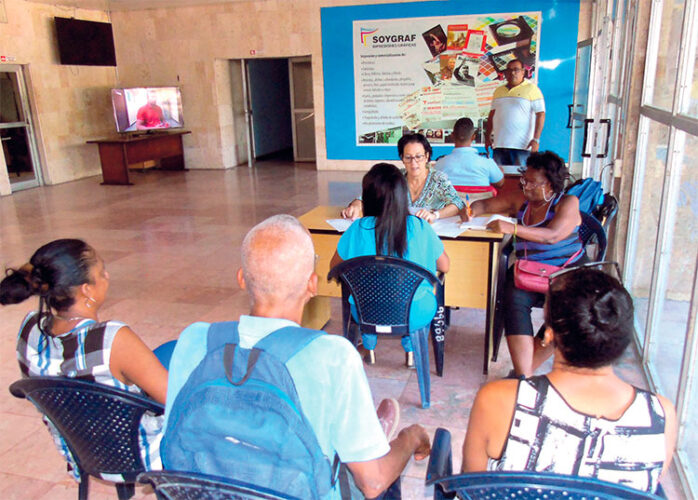
In this sense, they develop job fairs and opportunities; actions are carried out within the community, where different entities and organizations are associated (Labor Directorate, CDR, FMC, CTC, social workers) to bring proposals of work and ways to legality to those who do not have them.
«The CTC and its unions have yet to reach many, but with those we do talk to, we tell them what it means for their present and future to be in informal employment.
«In the short term, it is not having a contract that covers basic issues such as vacation, maternity leave, or salary support in the event of an accident at work; in the long term, it is not accumulating years of service and being left without guarantees for their retirement.
«Some understand the reasoning, correct themselves and get out of undeclared work, others say they know the implications but prefer to ignore them, which is really unfortunate and becomes a challenge for trade unions».
Not Standing Idle
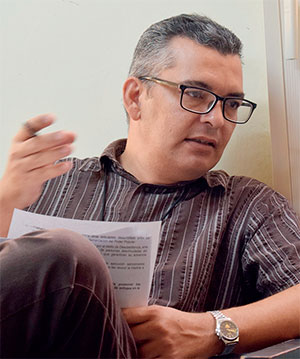
Ariel Fonseca Quesada, Director General of Employment of the Ministry of Labor and Social Security (MTSS), stated that they are not standing idly by. The agency is engaged in a group of actions aimed at reducing the levels of informal employment and promoting a change in approach so that the person is not placed in a state of voluntary vulnerability by not generating the right to social security.
He stressed that the decree-laws recently approved by the Council of State on the legal system for non-state forms of management, strengthen the provisions to reduce this problem. «Since their obligations to the people they hire are specified; self-employment hires are limited to three people, including family members, and the contraventions and measures to face violations in terms of hiring and the presence of informal labor are reinforced.
He added that by the end of June 2024, a total of 79,597 fines had been imposed by the competent authorities, of which 19,349 were for illegal activities. The provinces of Pinar del Río, Havana, Matanzas, Villa Clara, Las Tunas and Santiago de Cuba were the most represented.
«In the agricultural sector, which accounts for 23% of undocumented workers, according to the results of ENO 2023, Decree Law 80 on the Special Social Security Regime for the Agricultural and Forestry Sector has been enacted, introducing new subjects and reaching 100% coverage in the sector,» he said.
Among other actions, a joint project is being developed with the University of Havana as part of the Sector Program approved by the Ministry of Science, Technology and Environment of Cuba for the MTSS on this topic: Socio-economic and labor informality. Structural dynamics, relations and representations of informal economic practices in Cuban economic spaces.
The struggle has begun. It is time to enforce legality and comply with the policies established to protect workers. The helplessness in terms of labor guarantees that those in informal employment now face should be an incentive for those whose mission it is to put this matter in order.
*Note: The interviewees appear without their last names in order to respect their wishes.
Acerca del autor
Periodista cubana. Máster en Ciencias de la Comunicación. Profesora Auxiliar de la Universidad de Oriente. Guionista de radio y televisión.
Graduada de Periodismo. Subdirector Editorial del Periódico Trabajadores desde el …
Graduada en Licenciatura en Periodismo en la Facultad de Filología, en la Universidad de La Habana en 1984. Edita la separata EconoMía y aborda además temas relacionados con la sociedad. Ha realizado Diplomados y Postgrados en el Instituto Internacional de Periodismo José Martí. En su blog Nieves.cu trata con regularidad asuntos vinculados a la familia y el medio ambiente.

